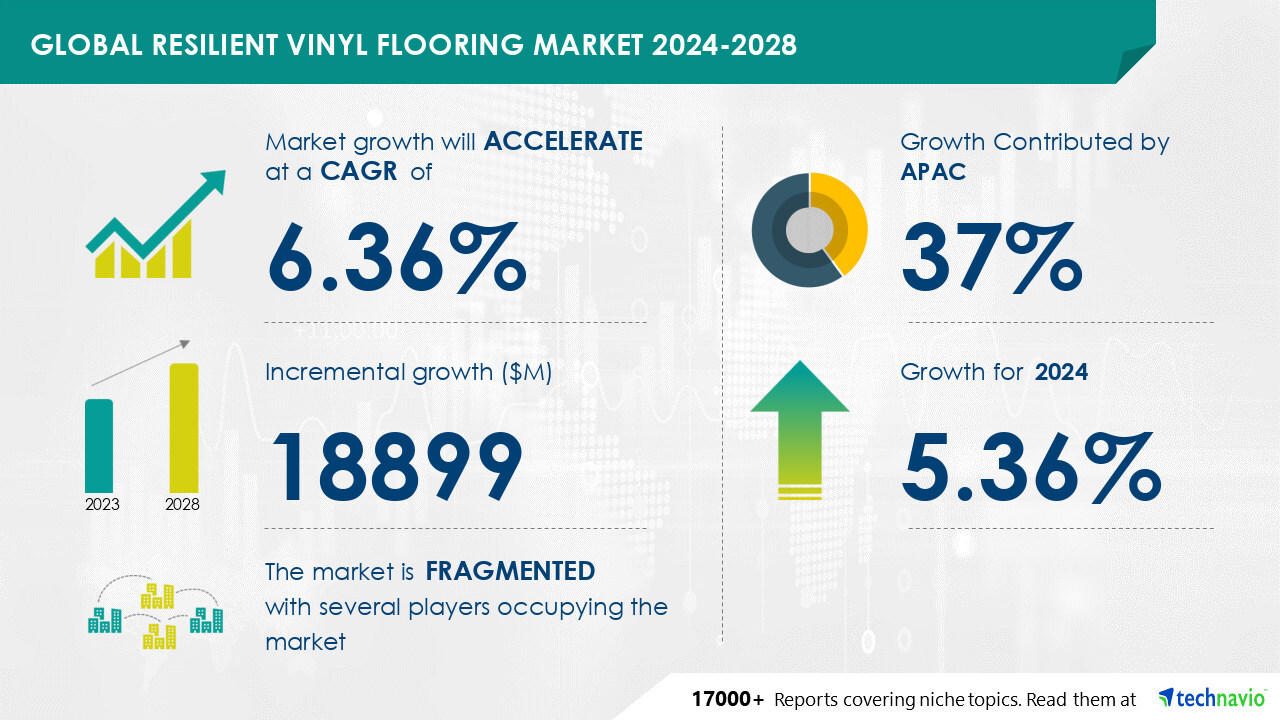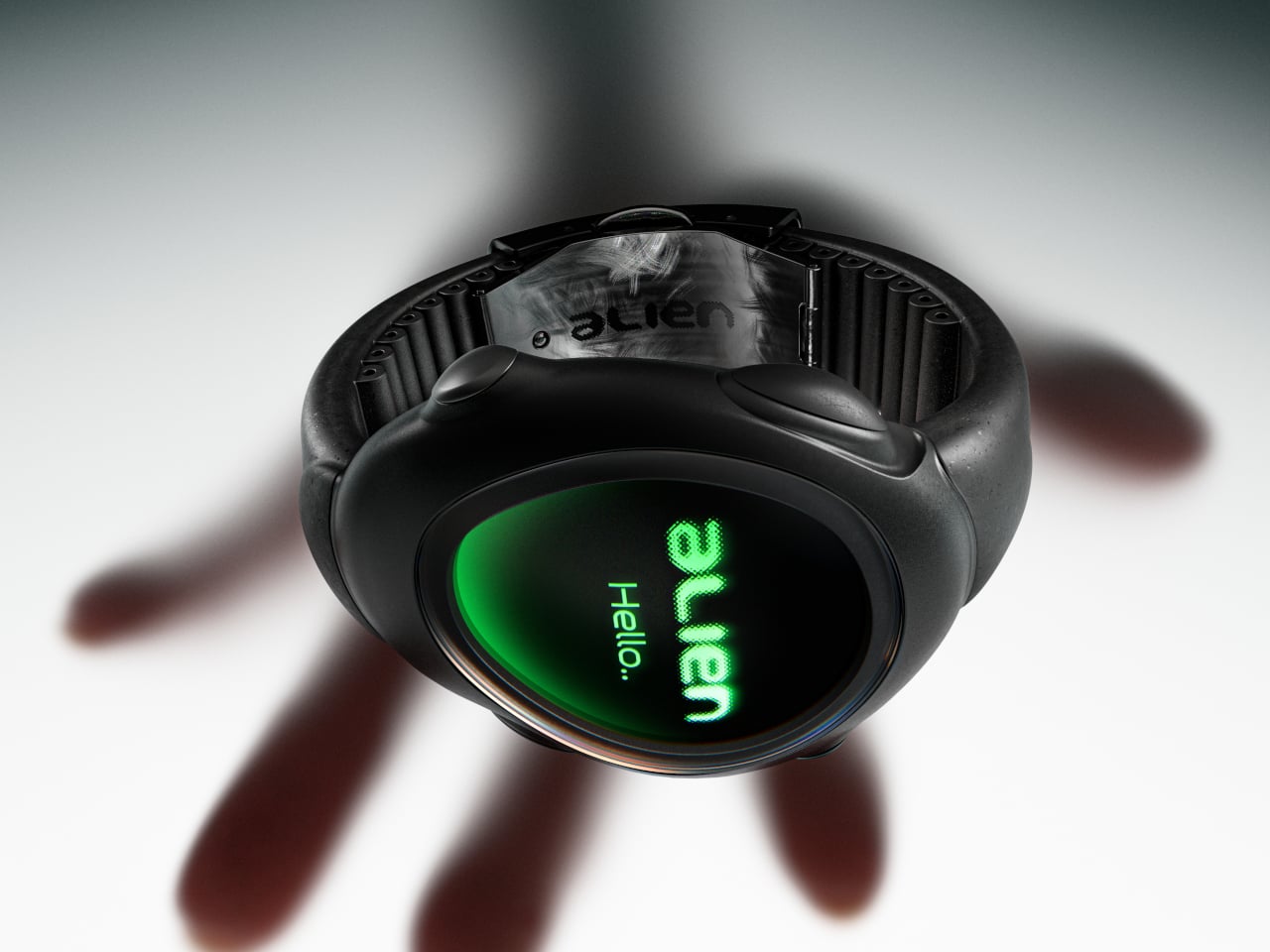NEW YORK , Aug. 30, 2024 /PRNewswire/ -- Report with market evolution powered by AI- The global resilient vinyl flooring market size is estimated to grow by USD 18.89 billion from 2024-2028, according to Technavio.
The market is estimated to grow at a CAGR of 6.36% during the forecast period. Increase in building and construction activities is driving market growth, with a trend towards emergence of hybrid resilient vinyl flooring.

However, installation and maintenance issues of resilient vinyl flooring poses a challenge. Key market players include AAMTAC Co. Ltd.
, AHF LLC., American Biltrite Inc., AWI Licensing LLC, Beaulieu International Group, Berkshire Hathaway Inc.
, Bostik Ltd., Congoleum Corp., Forbo Management SA, Gerflor Group, Interface Inc.
, IVC Group, LX Hausys Ltd, Lowes Co. Inc., Mannington Mills Inc.
, Metroflor Corp, Milliken and Co., Mohawk Industries Inc., Novalis Flooring GmbH, Parterre Flooring and Surface Systems LLC, REGUPOL Germany GmbH and Co.
KG, Responsive Industries Ltd., Roppe Corp., and Tarkett Group.
Get a detailed analysis on regions, market segments, customer landscape, and companies - Click for the snapshot of this report Key Market Trends Fueling Growth The resilient vinyl flooring market continues to grow, driven by its durability and affordability. Businesses and homeowners value its easy maintenance and resistance to wear and tear. Vinyl flooring's versatility, available in various designs and colors, caters to diverse consumer preferences.
Its eco-friendly attributes, such as recyclability and low VOC emissions, add to its market appeal. Overall, the resilient vinyl flooring market is a thriving industry, offering significant opportunities for manufacturers and retailers alike. The resilient vinyl flooring market is thriving, with popular choices including vinyl, cork, PVC, rubber, linoleum, and composite tiles.
Hospitals, schools, retail establishments, offices, and other non-residential spaces are increasingly opting for resilient flooring due to its slip resistance, water resistance, and hygiene benefits. Ultramodern workplaces and offices prefer these flooring options for their modern look and durability. Construction projects in sectors like healthcare and education are driving demand for resilient flooring.
Technology advancements, such as 3D printing, are revolutionizing production processes. Consumer behavior is shifting towards eco-friendly flooring, leading to increased interest in recycled raw materials. Luxury vinyl tiles and composite tiles are gaining popularity for their aesthetic appeal and affordability.
Machinery for manufacturing resilient flooring is becoming more efficient, reducing production costs. Flooring options like cork and linoleum offer environmental advantages, making them attractive to businesses and homeowners alike. Overall, the resilient flooring market is poised for growth, with trends leaning towards sustainability, technology, and functionality.
Discover a Comprehensive 360° Market Analysis: Understand the Impact of AI. For detailed information- Request Sample! Market Challenges The resilient vinyl flooring market is experiencing steady growth due to its durability and affordability. Businesses and homeowners value the easy maintenance and resistance to moisture that resilient vinyl flooring offers.
Its realistic appearance and wide range of design options make it a popular choice for various applications. Manufacturers continue to innovate, providing improved performance and sustainability features. Overall, the resilient vinyl flooring market is a reliable and cost-effective solution for flooring needs.
The resilient vinyl flooring market faces various challenges in both non-residential and residential sectors. In non-residential applications, hospitals and schools demand flooring options with superior hygiene, slip resistance, and water resistance. Cork and linoleum are alternatives, but vinyl's affordability and ease of maintenance make it a popular choice.
Manufacturers must invest in machinery to produce ultramodern workspaces and offices' resilient flooring. PVC and rubber are common materials, but environmental impact is a concern. Recycled raw materials offer a solution.
Consumer behavior influences the market, with a shift towards luxury vinyl tiles and composite tiles. Technology, such as 3D printing, offers new possibilities. Construction projects require efficient flooring solutions, with minimal downtime and quick installation.
In the residential sector, residential wards in clinics and hospitals also require resilient flooring. Hygiene, slip resistance, and water resistance are essential. Flooring must be durable and withstand heavy foot traffic.
Overall, the resilient flooring market requires continuous innovation to meet the demands of various sectors, while addressing concerns about environmental impact and consumer preferences. For more insights on driver and challenges - Download a Sample Report Segment Overview This resilient vinyl flooring market report extensively covers market segmentation by 1.1 Luxury Vinyl Tile (LVT) 1.
2 Vinyl sheet 1.3 Vinyl tile 2.1 Residential 2.
2 Commercial 3.1 APAC 3.2 North America 3.
3 Europe 3.4 Middle East and Africa 3.5 South America 1.
1 Luxury Vinyl Tile (LVT)- The resilient vinyl flooring market is experiencing steady growth due to its durability and affordability. This type of flooring is popular for both residential and commercial applications. Its waterproof and easy-to-clean features make it a preferred choice for high-traffic areas.
Manufacturers continue to innovate, offering a wide range of designs and textures to meet consumer demands. The market is expected to expand further, driven by increasing demand for sustainable and low-maintenance flooring solutions. For more information on market segmentation with geographical analysis including forecast (2024-2028) and historic data ( - ) - Download a Sample Report Research Analysis Resilient flooring, including PVC and rubber varieties, continues to gain popularity in various sectors due to its durability, ease of maintenance, and versatility.
This type of flooring is increasingly being used in shopping centers, commercial units, and ultramodern workspaces. The market for resilient flooring is driven by the trend towards environment-friendly building materials, with an increasing focus on using recycled raw materials. Consumer behavior is shifting towards sustainable and eco-friendly options, making resilient flooring an attractive choice.
In the construction industry, resilient flooring is used extensively in hospitals, schools, retail establishments, and other high-traffic areas. Machinery and machinery production sites also benefit from the resilience and durability of these flooring options. Luxury vinyl tiles and composite tiles are popular choices for their aesthetic appeal and affordability.
Other alternatives like cork and linoleum are also gaining traction in the market. Overall, the resilient flooring market is expected to grow significantly in the coming years, driven by the demand for sustainable and durable flooring solutions. Market Research Overview Resilient flooring, including PVC and rubber varieties, continues to gain popularity in various sectors due to its durability, affordability, and design versatility.
This type of flooring is widely used in shopping centers, construction projects for commercial units, and ultramodern workspaces. The environmental impact is a growing concern, leading to increased interest in using recycled raw materials. Consumer behavior favors flooring options like luxury vinyl tiles and composite tiles, which mimic the look of natural materials such as wood, stone, and cork, but offer superior resistance to water and slippage.
Technology advances, including 3D printing, further expand the possibilities for resilient flooring in non-residential and residential applications. Hospitals, schools, retail establishments, offices, and other non-residential spaces prioritize hygiene and slip resistance, making resilient flooring a top choice. Water resistance is also crucial for areas prone to spills or moisture, such as hospital wards, clinics, and kitchens.
Table of Contents: 1 Executive Summary 2 Market Landscape 3 Market Sizing 4 Historic Market Size 5 Five Forces Analysis 6 Market Segmentation Type Luxury Vinyl Tile (LVT) Vinyl Sheet Vinyl Tile End-user Residential Commercial Geography APAC North America Europe Middle East And Africa South America 7 Customer Landscape 8 Geographic Landscape 9 Drivers, Challenges, and Trends 10 Company Landscape 11 Company Analysis 12 Appendix About Technavio Technavio is a leading global technology research and advisory company. Their research and analysis focuses on emerging market trends and provides actionable insights to help businesses identify market opportunities and develop effective strategies to optimize their market positions. With over 500 specialized analysts, Technavio's report library consists of more than 17,000 reports and counting, covering 800 technologies, spanning across 50 countries.
Their client base consists of enterprises of all sizes, including more than 100 Fortune 500 companies. This growing client base relies on Technavio's comprehensive coverage, extensive research, and actionable market insights to identify opportunities in existing and potential markets and assess their competitive positions within changing market scenarios. Contacts Technavio Research Jesse Maida Media & Marketing Executive US: +1 844 364 1100 UK: +44 203 893 3200 Email: [email protected] Website: www.
technavio.com/ SOURCE Technavio.



















